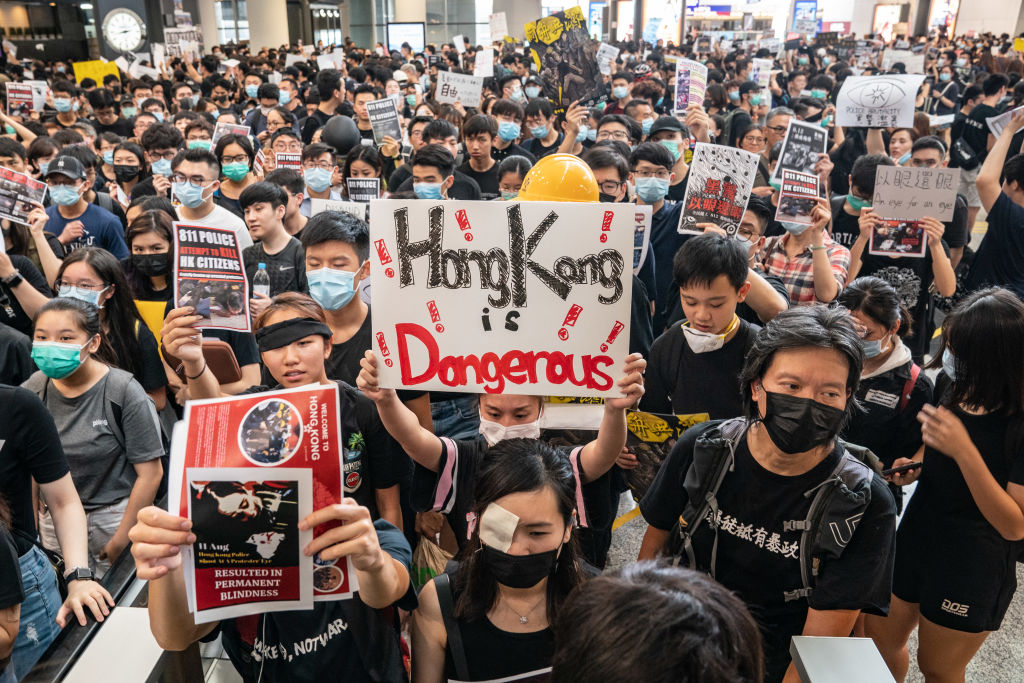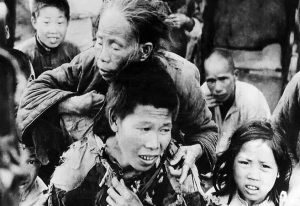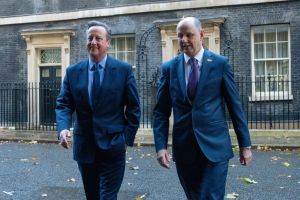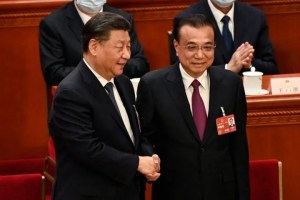What do you call a global hub without an airport? Hong Kong, at least on Monday. No other city can lay claim to this impossible status, for no global hub can exist without an airport. The closure of Hong Kong’s airport on Monday morning indicates how far the crisis in Hong Kong has gone, and how close one of the world’s greatest cities now is to a one-way ticket.
For the fourth successive day, the world’s biggest flash mob has overrun one of the world’s busiest airports. The protesters have been peaceful – much more peaceful than anywhere else in the territory, where they have done their best to provoke the police as well as their fellow citizens. The police have also been more restrained than elsewhere, and haven’t (as of Monday morning) used tear gas or batons. There can be no doubt, however, that this kind of targeted protest is a passive-aggressive form of political violence – and that it must, sooner or later, be met with the purely aggressive form.
The protesters are following an outdated Western script that is more Tolstoy than Tiananmen. The tactic is itself euphemistic and self-deceiving. Cant terms like ‘non-violence’ and ‘passive resistance’ are fig leaves for the active seeking out of violence. The idea, from Adin Ballou and Henry David Thoreau to Gandhi and Martin Luther King, is to force a confrontation with the powers of the state, and thereby expose the iniquity of the system. But Hong Kong is the wrong place to play this game, and not just because its liberal system isn’t iniquitous.
The game of passive resistance only works when the authorities play by the liberal rules. Shouting ‘shame’ only works against a government willing to be shamed. In the early 1900s, Gandhi embarrassed the British in South Africa by demanding that, if they called themselves liberal and just, they should treat him and his fellow Indians as equals, rather than lump them in with the black Africans that Gandhi despised. Meanwhile in Namibia, the Germans, less troubled by liberal conscience, were committing genocide against the locals. Imagine if this had happened at an American airport. There would be blood everywhere by the end of the first day. The Hong Kong authorities have been patient – wise, even – in avoiding violent repression. But now the protesters are forcing their hand – and presuming on the protection of a liberal system that they denounce and undermine, and which is itself under pressure from the illiberal authorities in Beijing.
It would be absurd to expect the Beijing authorities to respond with indiscriminate slaughter. It would be stupid to expect the Hong Kong authorities not to use force when the airport is besieged. In a place like Hong Kong, which imports its own drinking water and food, the airport is a key institution of state, just like the Legislative Council, or HSBC, or the Chinese foreign ministry building, or Cathay Pacific, whose shares pancaked this morning. Hong Kong is a liberal city-state because it works: because its real business is business.
No Chinese government has ever claimed to be liberal, and all Chinese governments have functioned as empires. The current Chinese government has, however, tolerated the liberal system that the British hurriedly installed on their way out in 1997. Admittedly, Beijing has made it clear that when the 50-year treaty provision for ‘one country, two systems’ expires in 2047, Hong Kong will be absorbed into the Guangdong region. The economic ground for this has already been laid, and so has the political path. In February, the Chinese government released development plans for the Guangdong-Hong King-Macau-Greater Bay Area, which proposes to integrate nine mainland cities with the two Special Administrative Regions (SARs) of Hong Kong and Macau, forming a hi-tech hub for research, development and production, like the Bay Area on the other side of the Pacific.
The Greater Bay Area plan acknowledges that Hong Kong is an ‘international financial, transportation and trade center, as well as an international aviation hub’; that Hong Kong’s business environment that is ‘highly internationalized and based on the rule of law’, and that Hong Kong also has a ‘global business network and is among the freest economies in the world’. The plan also commits to ‘maintaining the long-term prosperity and stability of Hong Kong’, and to ‘fully and faithfully implement the principle of “one country, two systems” under which the people of Hong Kong govern Hong Kong’.
If the political path is being laid, the political designation is unclear. The plan also promises to ‘fully apply Xi Jinping Thought on Socialism with Chinese Characteristics for a New Era and the spirit of the 19th National Congress of the Communist Party of China’. What that means today, let alone by 2047, is anyone’s guess. For now, at least, Hong Kong’s rule of law and liberal system are assets in Beijing’s regional and global plans. The Bay Area is expected to foster ‘closer cooperation between the Mainland and the two SARs, thereby creating more opportunities for the socio-economic development of the two SARs, and for Hong Kong and Macao compatriots wishing to develop careers on the Mainland’. Not, we note, to encourage Mainlanders to destabilize Hong Kong by moving en masse into the SARs.
The only en masse movement of Mainlanders into Hong Kong that is on the cards today or tomorrow is one from the People’s Liberation Army who, Chinese state media now claim, are warming up in Shenzhen, the nearest Mainland city to Hong Kong. The protesters in Hong Kong are not just following the wrong script, they’re hastening the worst of endings. If they want the moral drama of ‘Tank Man’, they will get him – because they’ll get the tanks first.
Dominic Green is Life & Arts Editor of Spectator USA.


















